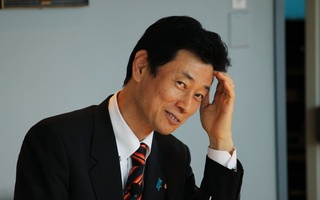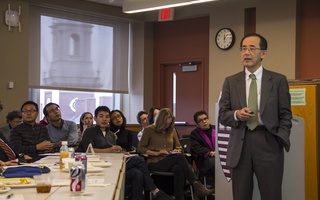University of Washington-Seattle Professor Saadia M. Pekkanen addressed the recent militarization of Japan’s space program and its implications for the United States and East Asia at event at the Weatherhead Center on Tuesday.
The event, which was co-sponsored by the Weatherhead Center’s National Security Program and Program on U.S.-Japan Relations, was the second event held on U.S.-Japan relations this semester. Pekkanen urged audience members to consider the current state of Japan’s space capabilities, the tendency of national security experts to overlook Japan, and the historical trends leading to Japan’s military expansion.
She emphasized that although Japan’s space budget is estimated to be about 5 percent of the United States’, its technology to explore space is very advanced.
“Japan has come a very, very long way since 1955. Japan, like a lot of the U.S.’s allies, could have relied on the U.S. for access to space. It chose not to do that,” Pekkanen said. “I would put Japan squarely among the world’s top five space powers.”
She also cited Japan’s use of artificial intelligence in rockets as an example of its sophistication in the national security arena.
Pekkanen addressed reasons as to why some national security experts have failed to recognize the strength of Japan’s space program, including a longtime Japanese policy of only using space technology for “peaceful purposes.”
“There’s been a lack of consensus about Japan’s military capabilities and many claims about Japan’s culture of antimilitarism,” she said.
According to Pekkanen, Japanese Prime Minister Shinzo Abe has overseen the convergence of space research and military technology in both the public and private sectors. The Japan Aerospace Exploration Agency, Japan’s equivalent of NASA, recently moved under Abe’s direct purview.
Shannon M. Kearney, a senior at Wellesley College studying Japan’s space program, said she thought Pekkanen addressed the space race in Asia from a unique angle.
“She had a lot of energy. I’ve never really thought a lot about Japan’s space program from a military perspective,” Kearney said.
Yuki Yasuda, who works for the Japanese Ministry of Defense, said that he was interested in Pekkanen’s discussion of Japan’s response to recent North Korean missile launches.
“I found the talk interesting... especially as Japan changes from an anti-militarized policy to a more aggressive or positive approach. There’s been a change of tide,” Yasuda said.
Read more in News
Smith Center Construction Takes a Toll on Local BusinessesRecommended Articles
-
Orphan or Partner?T HE ALREADY STRAINED RELATIONSHIP between Japan and the United States is becoming even more delicate. The attitude of the
-
Panel Optimistic for Recovery in JapanAt a Harvard Kennedy School panel on the recent Japanese earthquake and subsequent problems at the Fukushima Daiichi Nuclear Power Plant last night, panelists were mostly optimistic about Japan’s response in the wake of the disaster.
-
 Senior Vice-Minister Discusses Japan's Economy at Harvard Kennedy School
Senior Vice-Minister Discusses Japan's Economy at Harvard Kennedy School -
Professor Discusses Ethics of World War II Biological Weaponry TestsThe Japanese army killed around 10,000 Chinese civilians, Russians, and American prisoners of war while testing biological weaponry during World War II, but the U.S. government withheld knowledge of the fatal tests. Even though the episode has often been overshadowed, it played a significant role in America’s ethical history, according to professor David S. Jones ’97 at the Ethics of Human Experimentation, a discussion hosted by the Harvard Undergraduate Bioethics Society Monday night.
-
 Former Bank of Japan Gov. Dispels Myths About Japanese Economy
Former Bank of Japan Gov. Dispels Myths About Japanese Economy













